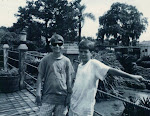After lunch I caught the tail end of the second panel on how to market your music for TV, movies, and video games. The panel was different, maybe because the speakers were in advertising and TV, and seemed much more straightforward in what they were looking for from musicians.
Next, I attended the third and final panel of the day entitled "Cutting through the Clutter" which consisted of writers/publishers of online and print magazines about music. This panel sounded off on the amount of music demos they receive and how they don't listen to most of the stuff or even read all their e-mails. Several panelists said they don't usually consider an artist unless a knowledgable source, say in a blog or e-mail, recommends their music. In other words, you have to know someone to get coverage. One of the panelists kept harping about how she detests CDs and press kits because they are a waste of resources, bad for the environment, etc. At the Q & A session, a Colombian musician asked the panelists why, if a musician spends months and years of his/her life working on a CD, then why can't you spend a few minutes listening to the demo? The audience clapped and I thought it was a damn good question. One panelist gave a stock answer about not having time, getting thousands of e-mails, etc. Another panelist remarked that she discovers new music all the time at conferences and festivals like this one, again begging the question of how artists get chosen for the LAMC and who gets left out and overlooked.
Overall, I found the panels informative, but there was one theme that kept popping up- how musicians could get their music in front of somebody at a label, venue, magazine, etc. I found many of the panelists' answers to be condescending. It reminded me a lot of the dynamics of graduate school research proposals for granting agencies. The answers and explanations given by panelists began to sound the same as the rejection statements and advice I have received from funders: "No means Not Now;" "We get thousands of submissions;" "Keep trying;" "Stay true to your heart and something positive will happen." These are truthful statements, surely, but they reinforce the dependence of graduate students and struggling musicians on the opinions of a few gatekeepers who guard the ever-shrinking monetary and honorary pathways to institutional success. And these statements fail to alliviate the demographic pressures they readily acknowledge, if "record numbers" of applicants or demos of "high quality' appear, then why is not more effort made to open up wider avenues of access to the next level. Or perhaps we should begin to question the whole competitive nature of these contests, and encourage more collaboration in creative enterprise. Second, I was struck by how business focused the panels were. I wondered why there were no workshops on technical aspects, say a field guide to working with ornery sound men, or how to use new recording technology to get the "sound" you want.
Anyway, after the day's panels, I met Daliz and we traveled to Brooklyn for the night's concert at Prospect Park's Bandshell. There we met a few friends, ate some dinner and enjoyed the music of Toy Selectah, Fidel Nadal, and Ozomatli.
Toy Selectah is a DJ, he played some stuff to set the mood, did a good job.

Fidel Nadal is a reggaeman from Argentina. I liked his style and he had a few entertaining songs.


Ozomatli, a band from LA, is a multicultiral hodgepodge. They played myriad styles, from rap en espanol, early 90s R&B (they covered Color Me Badd), heavy metal, James Brown-funk, ska, reggae, pop, cumbia and even merengue. One of the singers showed off something from their recent tour of China and Mongolia, throat singing through a couple of numbers. One catchy song had this refrain, "Oye baby, oye mami, donde esta el afterparty?" The only song Ozo didn't play that I wanted to hear was their composition "Gay Vatos in Love." At the finale, like at all Ozo concerts, they came down from the stage and into the crowd, playing drums and horns and gathering everyone around them to chant. Then they paraded around the venue, bringing the crowd with them.






No comments:
Post a Comment